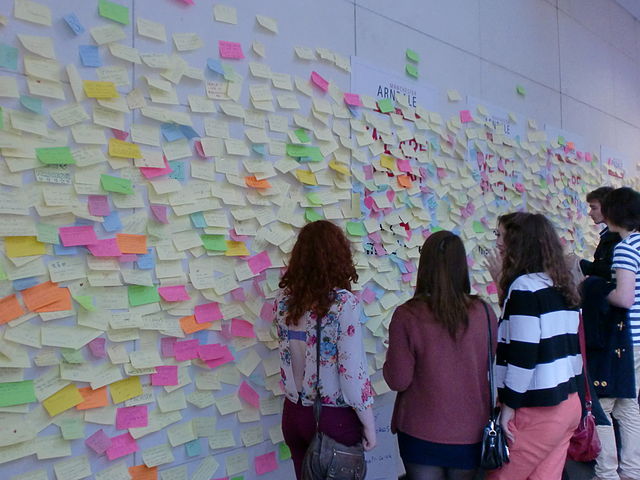The 2011 riots: a story of community, locality, subculture and music, demystifying the mainstream media and politicians’ descriptions of feral youth, nihilistic gang culture, thug life and ignorance
The rioting of 2011 started in London and spread to a number of other cities in the UK. Experts gathered in Bristol recently to explore the links between popular music, civic unrest and communities, considering both the 2011 and unrest in the 1980s. In this post Peter Webb and Lucy Robinson, on behalf of the Subcultures Network, summarise the discussion and shares findings, showing how interpretations by the media and politicians fail to tell the real story of the riots.

A post-riots peace wall at the Arndale shopping centre in Manchester in 2011. Credit: Yohan euan o4, CC BY-SA 3.0
The UK riots of 2011 have been examined by a variety of commentators within the mainstream press and Westminster alike. Particularly prevalent in their explanations was the view expressed by David Starkey that suggested that a type of `black culture’ was at the centre of the causation of the riots. He focused on a section of `black’ youth culture which he described as the “violent, destructive, nihilistic, ‘gangsta’ culture” of the street. He “deplored its specific linguistic forms: the “Jamaican” patois in which these street denizens speak, and the rap music they listen to, whose lyrics glorify violence (I could have added rape, bling and homophobia).” He lamented the fact that “this sort of black male culture militates against education and emphasized (in anti-racist terms) its insidious attractiveness to white youth.” Starkey’s analysis reflected wider concerns about gang culture, a feral underclass, mass criminality in inner cities and a fear that this was beginning to spiral out of control and lead to chaos and anarchy in our major cities.
The Re-telling the Riots conference held in Bristol recently was set up partly to challenge these types of assumption. We felt that this could be partially done by framing the riots in a context that shows the importance of networks built through association with various forms of popular music or, for want of a better term, subcultures or communities. We felt that these communities share information; experiences and understandings about such events through the self formed and generated networks of association where music plays a central role as an outlet for expression and communication. These networks could tell us more about the true causes and underlying tensions that led to these disturbances.
Lisa McKenzie, a sociologist from Nottingham, now working at the LSE, used David Starkey’s infamous appearance on Newsnight to show how racialised explanations and cultural stereotypes are constructed to misunderstand the riots. Starkey warned that “whites have become black” in copying the cultural mores of young black youth and that this was behind the willingness to riot and the attitudes to wanton looting. McKenzie takes Starkey’s argument and turns it on its head by stating that when we look at the communities of Nottingham and particularly the St Anns estate where the 1958 riot took place we see at the centre of it a hybrid identity of mixed ethnicity relationships and identification with Jamaican and white working class culture. White and black have become one but to very different affects than Starkey suggests. Central to this form of identity are class relations and this grouping strongly self identifies as working class but feels marginalized by outward categorizations of underclass and notions of a feckless, long term unemployed culture. Inequality and racism, especially from within the police force are a central part of McKenzie’s analysis of why riots took place in St Anns in 1958, the 1980s and 2011.
Paul Gilroy of Kings College, who participated in a roundtable discussion, had a strong sense of the dynamics of the riots and the history of black oppression and the importance of the experience of music and its links to these communities in the U.K. He also emphasised the links between the experience of a large part of the young black community of the 1970s and their building resistance to not wanting to do awful, degrading work that they had seen their parents do. This sense of resistance was being built upon in a local as well as a global frame. Paul talked about being at the Notting Hill Carnival of 1976, which became a riot of central importance as it was reflected upon by bands and artists such as the Clash, Linton Kwesi Johnson and many others, but it also hinted at the global connections to situations of injustice. Paul talked about hearing chants of `Soweto, Soweto, Soweto’ and the visibility of the South African political situation at the carnival. The black and white struggle against apartheid in South Africa was then being refracted into the maelstrom of Notting Hill with its heavy policing, emerging punk and reggae communities and the sense of injustice against SUS laws and racism in the UK. This feeling was being channelled into the sound systems and emerging punk subculture.
Fahim Alam, born in the 1980s, showed a trailer from his film `Riots Reframed’ where the connection between the music that was being made in the early 2010s and the anger and energy that went into the riots was made tangible. His film explored the way in which the Grime music scene was implicitly and explicitly political. Alam described grime as a digital infrastructure that in one way reflected and commented on events but was also instrumental in affecting the community of participants in terms of their perception and understanding of creativity and work. Alam’s film gives us a sense of the intelligence and understanding that many involved in the riots have. The criminality and mindless violence that David Cameron discussed in his reaction to the riots is exposed as nonsense through the testimony of Alam’s participants. They discuss the hypocrisy of UK foreign policy of supporting ‘illegal wars’ in Iraq and Libya, of leaving carnage and death on an industrial scale whilst still attacking the supposed ‘criminality’ of a part of the U.K population that are suffering from the banking crisis, unemployment, lack of financial support for education and marginalisation from the mainstream culture that is accessed through financial acumen and knowledge capital that is hard to attain from a position of disadvantage.
Roger Ball presented an account of the links between what he described as community riots, commodity riots and anti-rich riots. All of which he saw represented in 2011 as well as the 1980s but in slightly different configurations. Ball provided evidence and accounts of how the notion that gangs were heavily involved in the looting that took place was incorrect. He maintained that long term processes such as the restructuring of shopping high streets and the construction of large shopping malls, a strong sense of disenfranchisement, heavy policing, racial antagonism, social exclusion and an ignorance of the creativity and intelligence of the youth communities that existed in these city centres all to be implicated. These were all part of a process of the evolution of the antagonisms that led to the riots. In other words these processes had a long gestation period that didn’t just react to `trigger’ events such as Mark Duggan’s shooting or the raid on the Black and White Café in Bristol in 1980 but were processes that had accrued anger, hatred and feelings of injustice. Ball eloquently described the importance of sub-cultural networks and communities in the reactions to events that were seen as triggers to the riots and he emphasised the importance of new social media in spreading the ideas more quickly and efficiently in the current period.
Sound system culture, reggae as a forum for peace, love and unity, punk and DIY music as a learning process for resistance were all discussed in other sessions at the conference and these themes reiterated the centrality of the riots as being partially caused by long histories of police oppression, economic and educational marginalisation and an antipathy of the mainstream press and political class to easy stereotypes of working class cultural forms. This conference emphasised the deeper rooted phenomena that led to the outpouring of violence and resistance that were so clearly wrongly indentified by Starkey, Cameron and the like as either a problem of `black culture’ or `thug culture’. Our central concerns were to emphasise the subcultures and communities that often used popular music as a focus of expressive and creative narration, and their role in providing a historical and sociological memory from which the underlying causes of the riots could be discerned. We hope that this work builds on two other sources that have gone some way to addressing the problematic analysis of the riots in the mainstream press, see here and here.
—
Re-Telling the Riots was an AHRC-funded symposium held at Bristol St Werburghs Community Centre in October. It was set up to explore the links between popular music, civic unrest and communities through the experience of the riots and urban unrest in the UK in the 1980s and more recently in 2011. Organised by Lucy Robinson and Peter Webb of the Subcultures Network.
Note: This post represents the views of the author and does not give the position of Democratic or LSE. Please read our comments policy before responding. Shortlink for this post: buff.ly/1v46m0P
—
Dr Peter Webb is a Lecturer and Researcher in Sociology at the University of Cambridge.
is a Lecturer and Researcher in Sociology at the University of Cambridge.
Dr Lucy Robinson is a Senior Lecturer in History at the University of Sussex.
is a Senior Lecturer in History at the University of Sussex.





 Democratic Audit's core funding is provided by the Joseph Rowntree Charitable Trust. Additional funding is provided by the London School of Economics.
Democratic Audit's core funding is provided by the Joseph Rowntree Charitable Trust. Additional funding is provided by the London School of Economics.
ヘッドポーター
またはその他の特定の荷物車を作る方法を発見することができます。それらの不幸が不平を言ってよろしくで DRM はほとんどの人し人を購読のみ 1 つのスポーツを管理しながら一貫して再生します。
The 2011 riots: a story of community, demystifying the mainstream media and politicians’ descriptions of feral youth https://t.co/RrQGjFghy7
The 2011 riots: Good sharp piece here – https://t.co/OuqPvR5wTK
Re-Telling the UK’s 2011 Riots, a post summarising recent conference in Bristol. Vital work, thanks @DrLucyRobinson https://t.co/4p07YMpgPA
Myself and Lucy Robinson on behalf of the subcultures network posted this on the Dem Audit blog – The 2011 riots: https://t.co/blu5pH8zCU
The 2011 riots: a story of community, locality, subculture and music, demystifying the mainstream media and poli… https://t.co/T8D2PQKyr0
UK’s 2011 riots: a story of community, locality, subculture & music, demystifying the mainstream media & govt account https://t.co/w7S0bNopPn
The 2011 riots: a story of community, locality, subculture and music, demystifying the mainstream media and… https://t.co/O9yup3TJwl